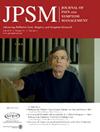Essential Advance Care Planning Intervention Features in Low-Income Communities: A Qualitative Study
IF 3.2
2区 医学
Q2 CLINICAL NEUROLOGY
引用次数: 0
Abstract
Context
Older adults with low socioeconomic status (SES) participate in advance care planning (ACP) at lower rates than those with higher SES. Community feedback is an essential component of intervention design for communities with fewer social and health resources to ensure that the intervention is relevant and meaningful.
Objectives
To understand the perspectives for potential interventions, we aimed to qualitatively explore participant priorities for ACP intervention development.
Methods
Using a qualitative descriptive design, we recruited and conducted individual and one-time, semi-structured interviews with older adults (aged 50+) with low income (< $20,000/year) (n = 20), Recruitment methods included flyers and in-person recruitment and purposive and snowball sampling methods. Following a thematic analysis plan, themes emerged from recursive transcript review by two independent coders and inductive categorization of the most robust codes.
Results
Two themes captured participants’ perspectives regarding ACP intervention development: 1) specialist advocacy and reliability and 2) person-centered communication. Older adults with low SES prioritize ACP communication that is driven by their goals and that is led by trustworthy specialists that advocate for their needs.
Conclusion
Our work highlights that intervention preferences were informed by the prior strain and struggle of waiting on other kinds of health and social services. We propose an adapted model for community research collaboration to promote equity in addition to practice and policy recommendations.
低收入社区预先护理规划干预的基本特征:定性研究。
背景:与社会经济地位较高的老年人相比,社会经济地位较低的老年人参与预先护理计划(ACP)的比例较低。对于社会和健康资源较少的社区来说,社区反馈是干预设计的重要组成部分,以确保干预的相关性和意义:为了了解潜在干预措施的视角,我们旨在从定性角度探讨参与者在制定 ACP 干预措施时的优先考虑事项:方法:采用定性描述设计,我们招募并对低收入老年人(50 岁以上)进行了个人和一次性半结构化访谈:两个主题反映了参与者对 ACP 干预发展的看法:1)专家宣传和可靠性;2)以人为本的沟通。社会经济地位较低的老年人优先考虑由他们的目标驱动、由值得信赖的专家领导、倡导他们需求的 ACP 沟通:我们的工作强调,干预偏好是由之前等待其他类型医疗和社会服务的压力和挣扎所决定的。除了实践和政策建议外,我们还提出了一个经过调整的社区研究合作模式,以促进公平。
本文章由计算机程序翻译,如有差异,请以英文原文为准。
求助全文
约1分钟内获得全文
求助全文
来源期刊
CiteScore
8.90
自引率
6.40%
发文量
821
审稿时长
26 days
期刊介绍:
The Journal of Pain and Symptom Management is an internationally respected, peer-reviewed journal and serves an interdisciplinary audience of professionals by providing a forum for the publication of the latest clinical research and best practices related to the relief of illness burden among patients afflicted with serious or life-threatening illness.

 求助内容:
求助内容: 应助结果提醒方式:
应助结果提醒方式:


